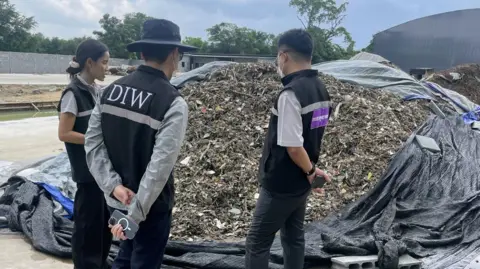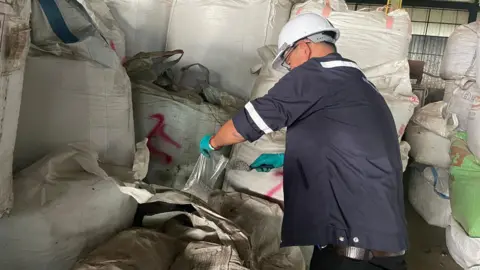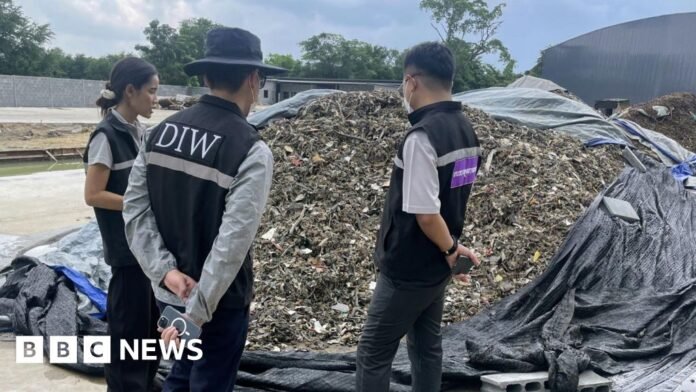Business reporter
 BBC
BBCAt an industrial site in eastern Thailand, Thitipas Choddaechachainun sifts through mounds of scrap metal, circuit boards and old computer keyboards in a cavernous warehouse next to a busy highway.
Like forensic scientists, she and her team of inspectors from Thailand’s industry ministry take samples of the waste and carefully bag it up to be taken away for analysis.
“A lot of this is clearly electronic waste and the company that owns this site doesn’t have a licence to process it,” she concludes. “This is a growing problem in Thailand.”
Ms Choddaechachainun is the head of a ministry task force trying to get to grips with Thailand’s e-waste problem.
Each week, she and her team head out to raid these unlicenced plants, which have popped up in recent years, mostly in rural areas, out of sight of the authorities.
But despite their efforts, the problem keeps growing.
In the past, China was a major recipient of electronic waste. Tonnes of it were shipped across the world, mostly from Western countries, to be dumped there and recycled cheaply.
But in 2018, Beijing banned imports. That forced shippers to look elsewhere and many of them alighted on Thailand and other countries in Southeast Asia.
Thailand introduced its own import ban in 2020 but it has not solved the problem. According to environmental group Earth Thailand, the amount of electronic waste flooding into the country has increased twentyfold in the past decade, from around 3,000 tonnes a year before the Chinese ban to 60,000 now.
Much of it comes from the US and the European Union, where consumers update their mobile phones and computers relatively frequently, and where per-capita use of electrical goods like fridges and washing machines is high.
Even though most Western countries have laws in place to prevent the dumping of e-waste in other countries, there are ways round them. Some waste, for example, is deliberately mis-labelled as “second-hand electronic goods for re-sale”, only to be smashed up, recycled and smelted once it reaches its destination.
That smelting is a dirty business, releasing mercury, lead and toxic fumes into the environment. But it is also lucrative, producing millions of dollars-worth of copper, gold and other valuable metals and minerals.

“Thailand is not getting anything from these businesses,” Thai industry minister Akanat Promphan tells the BBC in Bangkok. “There’s no value to the economy, it destroys the environment, it poses threats and endangers the livelihood of the people. That’s why I’ve formed a special task force to engage in a full-on crackdown on these businesses.”
He says the unlicenced recycling plants, many of which are Chinese-owned, have created “a sort of a garbage site – an international garbage processing facility – in Thailand”.
Once the e-waste arrives in Thailand and reaches the sites, it is fed into giant crushing machines which reduce it to a kind of gravel. It is then smelted to retrieve the valuable metal.
Mr Promphan says most of that metal is then exported to China.
The environmental impact of this business can be devastating.
On his small plot of land in eastern Thailand, 57-year-old Seng Wongsena tells the BBC that polluted water running from a nearby smelter has blighted his cassava harvest. “The plants don’t flower like the used to,” he says, complaining that the smell from the smelter is so bad that it keeps him awake at night.
Local environmentalists say the plant is operating illegally and have urged the local authorities to shut it down.
International environmentalists are campaigning on these issues too.
“Thailand has really borne the brunt of so much,” says Jim Puckett, executive director of the Basel Action Network, an NGO that campaigns against the shipment of toxic waste. “If you import this very dirty material for recycling you were going to contaminate your soil, your people.”
Thailand’s fight against e-waste is part of a much larger global problem.

According to the United Nations, the world produces over 60 million tonnes of electrical and electronic waste each year – twice as much as 15 years ago. That figure is projected to grow by more than 30% by the end of the decade.
Less than a quarter of it is collected and recycled responsibly, the UN says. And the rate of recycling is failing to keep up with the rate at which we are generating it.
Some countries have introduced laws to make the manufacturers of electronic goods – the likes of Apple, Samsung, Dell and Hewlett Packard – more responsible for taking back gadgets once they have reached the end of their life and disposing of them responsibly.
Thailand is planning to follow suit with a law of its own.
“I’m hoping for the enactment of this new legislation as soon as possible, maybe towards the end of this year, maybe at the beginning of next year,” Mr Promphan says. “I’m fully committed to take full actions against this illegal business and drive them out. Completely.”







